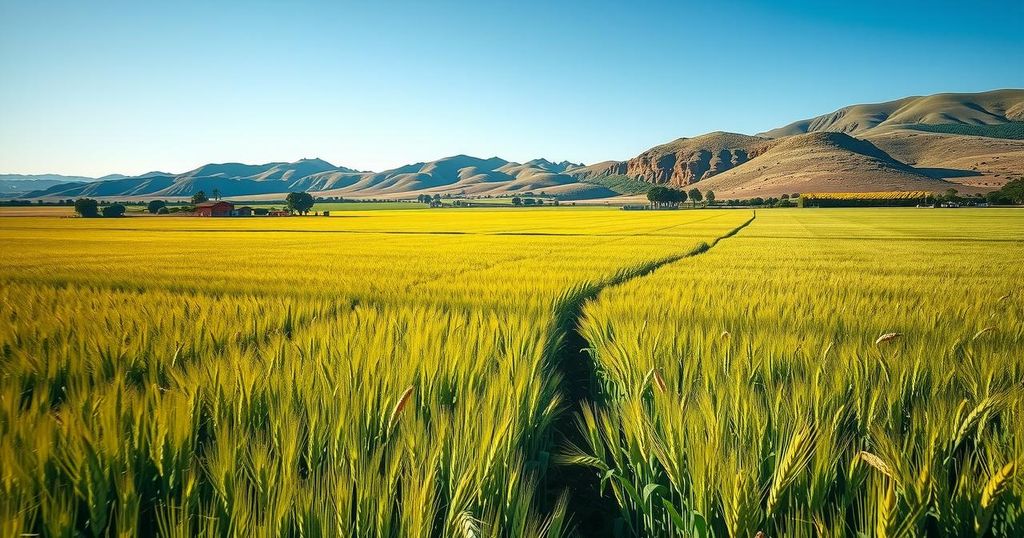- Argentina’s agricultural boom is driven by favorable weather and policy adjustments.
- Wheat planting has surged to 72.7% of projected area sown, signaling strong growth.
- The soybean harvest finished at 98.3% completion, surpassing previous expectations.
- Argentina’s strategic position could fulfill Egypt’s rising wheat import needs.
- Investors are looking at futures and agribusiness stocks as viable opportunities.
Argentina Agricultural Sector Positioned for Growth
The landscape for Argentina’s agricultural sector is shifting dramatically this year, largely thanks to a mix of favorable weather conditions, significant policy adjustments, and a robust global demand for key crops like wheat and soybeans. After grappling with years of instability and volatility, both farmers and investors are facing a landscape that is brighter and poised for record production as well as growth in exports. This transformation is particularly significant and worth keeping an eye on, as the potential returns are considerable, for those looking to invest in Argentina’s agricultural boom.
Wheat Planting Grows with Improved Conditions
As of the latest reports, the wheat planting season for 2025/26 is gaining traction, with the Buenos Aires Grains Exchange (BdeC) noting that by late June, 72.7% of the targeted 6.7 million hectares had already been sown. This marks a notable increase from just 60% a few weeks prior. The dry spell in July has also allowed farmers to wrap up harvesting last season’s corn and soy, thus freeing up fields for wheat planting. While some regions like Buenos Aires province were initially hindered by May’s excess rain, conditions improved, and soil moisture levels are now comparable to those of 2021, a high-yield year.
Soybean Harvest Exceeds Expectations
In the soybean sector, the 2024/25 harvest wrapped up at an impressive 98.3% completion, successfully overcoming earlier drought fears to yield 52.0 million metric tons—an increase of nearly 8% from the prior year and about 23% above the five-year average. This increase is attributed to an expanded planting area of 17.3 million hectares, the largest seen since the 2015/16 season. Furthermore, adjustments in tax policy, reducing the export tax on soybeans from 33% to 26%, have furthered Argentina’s competitive edge. The continuous Chinese demand for soybean oil and meal coupled with constraints on U.S. corn exports due to high prices positions Argentina’s agricultural producers favorably in the global market.
Investing in Argentina’s Agricultural Future
Looking ahead, Argentina’s agricultural sector seems strategically advantageous, particularly with rising demands from Egypt, which is set to import 13 million metric tons of wheat in the 2025/26 period. A robust wheat harvest from Argentina could provide a crucial alternative to Black Sea suppliers, possibly minimizing global price surges. Additionally, the country’s surplus in soybean products such as meal and oil, which represent about 85% of Argentina’s agricultural exports, places it in a favorable position to meet this international demand. For investors, this is a moment to consider various opportunities—with wheat futures at the Chicago Mercantile Exchange about to spike if output achieves or surpasses predictions, agribusiness companies like Cargill and Bunge could see profit margins expand as they manage logistics and trading in this burgeoning market.
In summary, Argentina’s agricultural sector is experiencing a significant shift towards growth driven by favorable weather conditions, strategic policy changes, and strong global demand for wheat and soybeans. Though risks persist, factors like increasing export opportunities and favorable planting conditions suggest that this could be a prime time for investment. Those looking to capitalize on this agricultural boom should keep an eye on futures and agribusiness stocks while staying informed about weather patterns and policy developments. The agricultural landscape in Argentina is, in fact, blossoming—making it worth the investment.






